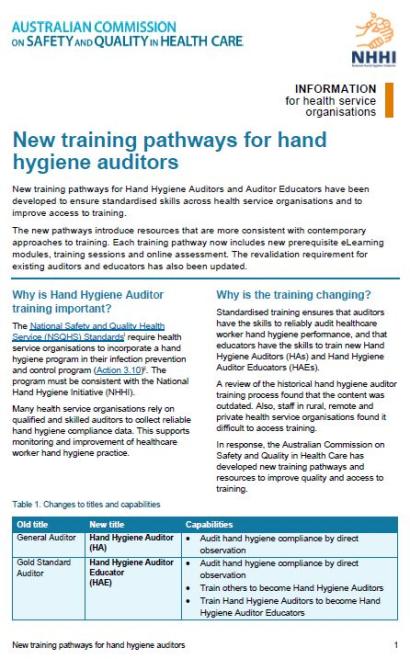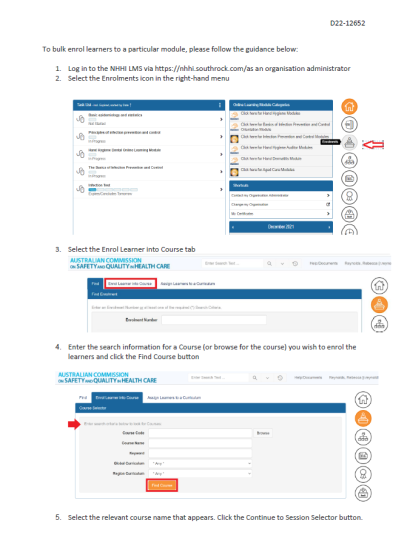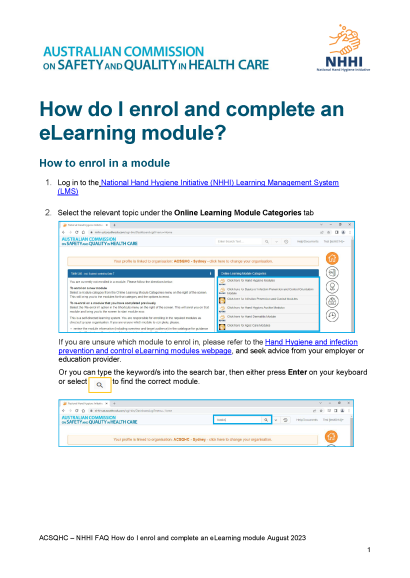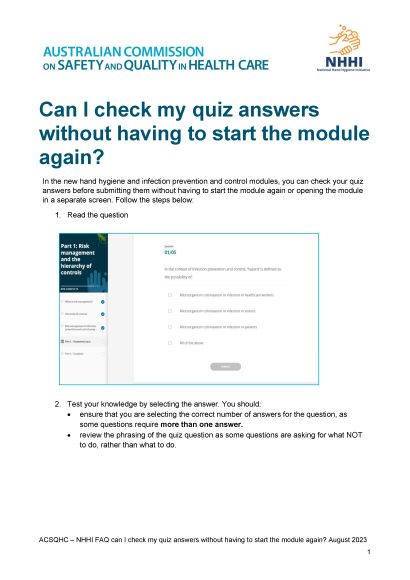Digital mental health services accredited to the National Safety and Quality Digital Mental Health (NSQDMH) Standards have been independently assessed to ensure they have systems in place to meet the necessary safety and quality requirements.
From 1 January 2023, the Australian Commission on Safety and Quality in Health Care (the Commission) became the custodian of a range of Quality Use of Medicines (QUM) functions, expanding our role in QUM stewardship. This follows the redesign of the Quality Use of Diagnostics, Therapeutics and Pathology (QUDTP) Program outlined in the 2022–23 Federal Budget.
Status updates for each function can be found below.
Information for healthcare services to guide practice and monitor improvement using the clinical care standard, and resources to support implementation.
The Commission has developed two eLearning modules to support infection prevention and control in aged care.
The Commission has developed 10 advanced infection prevention and control eLearning modules that can be undertaken individually, or as a suite, dependent on need.
The Basics of infection prevention and control module provides foundation infection prevention and control knowledge.
This page includes resources for implementation of the Preventing and Controlling Infections Standard of the National Safety and Quality Health Service (NSQHS) Standards and National Safety and Quality Primary and Community Healthcare Standards (Primary and Community Healthcare Standards).
Supporting improvements in health care for older people
The Commission supports the safety and quality of health care for older people. This page contains resources that support the delivery of high-quality care of older people across all care settings.
Aseptic technique is an element of standard precautions. Aseptic technique is a set of practices that protects patients from healthcare-associated infections and protects healthcare workers from contact with blood, body fluid and body tissue.
These modules support hand hygiene education and training for clinical, non-clinical and student healthcare workers. The content of the modules is consistent with the recommendations of the National Safety and Quality Health Service (NSQHS) Standards, specifically the Preventing and Controlling Infections Standard, and the Australian Guidelines for the Prevention and Control of Infection in Healthcare.
The NHHI LMS hosts the hand hygiene, infection prevention and control modules and hand hygiene auditor online learning. Health service organisations (excluding aged care) with 10+ staff can register for access to the NHHI LMS.
Registering an organisation allows learners (staff) to link their profiles to your organisation in the NHHI LMS.Organisations do not need to register for its staff (learners) to access the NHHI online learning modules. The organisation name does not appear on any completion certificates.
The NHHI LMS hosts the hand hygiene, infection prevention and control modules and hand hygiene auditor online learning.
The Infection Prevention and Control (IPC) Advisory Committee provides a mechanism for the Commission to consult with experts and key stakeholders on the development and implementation of national initiatives related to IPC.
Infection Prevention and Control (IPC) Week is held during the third week of October each year to highlight the importance of preventing infections. The theme for IPC Week 2025 is A proactive approach to IPC: Identify the risk, Protect patients and the workforce, Control the spread of infection. Everyone has a role in the prevention and control of infections in health care.
The Commission has developed a series of fact sheets for consumers and carers about infection prevention and control, and common and emerging healthcare-associated infections.
Antimicrobial stewardship




